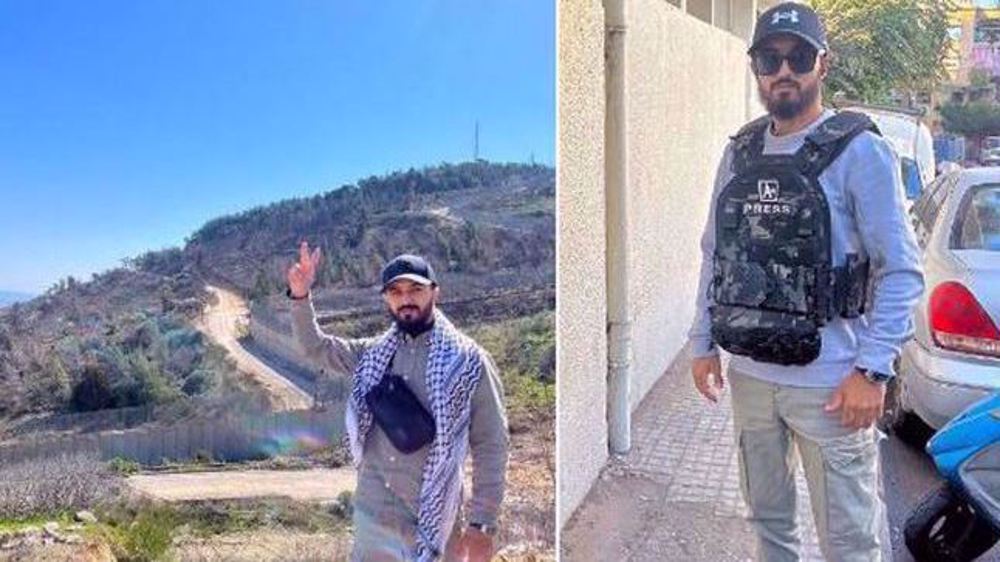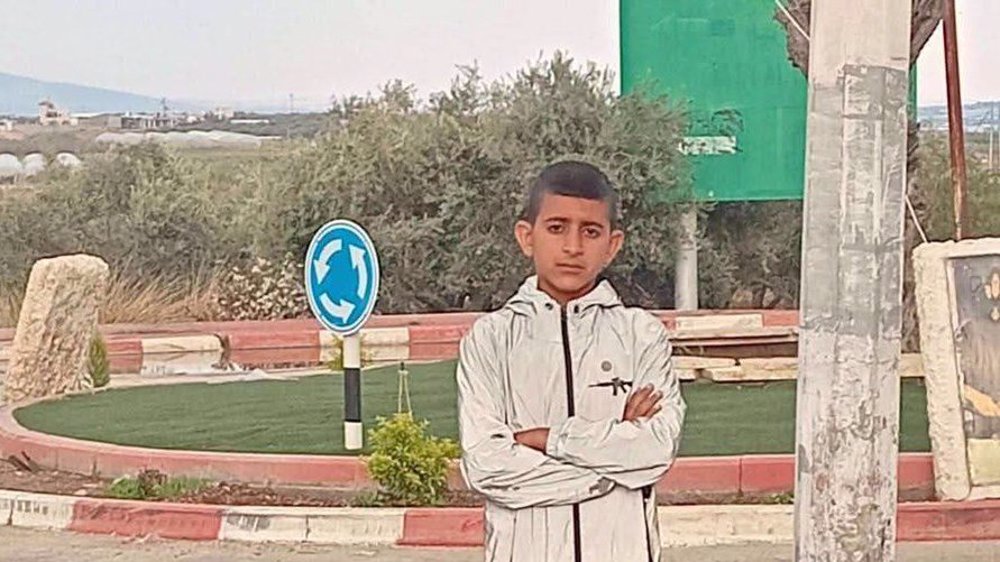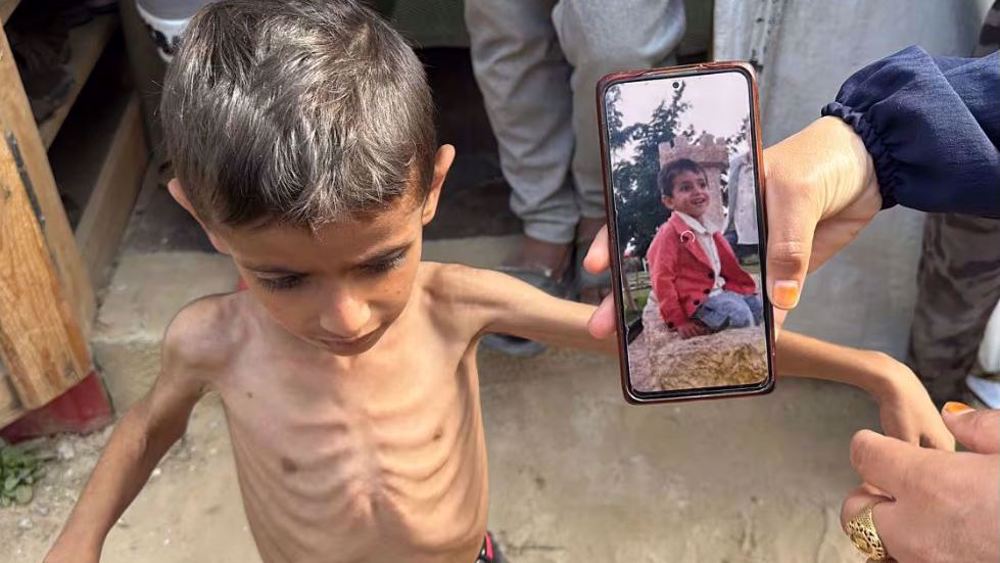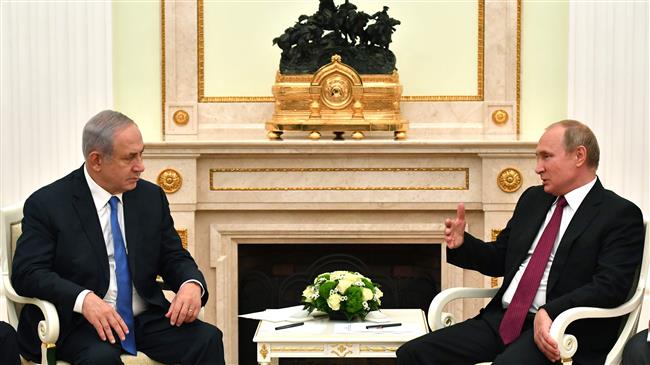Israeli PM holds talks with Russian president on Syria, Iran
Israeli Prime Minister Benjamin Netanyahu has held talks with Russian President Vladimir Putin on Iran’s role in Syria, where both Tehran and Moscow have been assisting the national army in its battles against Tel Aviv-backed militants.
During his Wednesday talks with Putin in Moscow, Netanyahu reiterated his call for an end to Iran’s anti-terrorism advisory mission in Syria amid concerns in Tel Aviv as Damascus government forces move to liberate the southern areas near the Tel Aviv-occupied Golan Heights from Takfiri militants.
“It is well-known for you – our focus is what is going on in Syria and Iran,” Netanyahu told Putin as they headed into their meeting. “Iran needs to leave Syria — that is not something new for you.”
An Israeli official, who spoke on condition of anonymity, cited Netanyahu as saying that the Tel Aviv regime does not intend to threaten Syrian President Bashar al-Assad’s rule but wants Moscow to work to remove “Iranian forces” from southern Syria near the Israeli-occupied territories.
Iran has no troops on the ground in Syria. It has been offering military advisory support to the Arab country’s government over the past years at the request of the legitimate government in Damascus.
Besides Tehran, Moscow has been carrying out an aerial bombardment campaign as a cover for ground operations by the Syrian army against a myriad of terror groups seeking to oust the Damascus government. Moscow, too, has military advisers in Syria. It also runs a number of military bases in the country.
Backed by Iran and Russia, the Syrian army has stepped up its gains on the battleground, liberating area after area from the militant groups, many of which have the backing of Israel and its allies in their mission to oust the Damascus government.
There have been no reports of Putin’s reaction to Netanyahu’s demand, but Russia has repeatedly underlined the need for the involvement of influential external players, including Iran, in efforts to resolve the deadly conflict gripping Syria.
On Wednesday, Russian Defense Minister Sergei Shoigu was quoted by the Italian newspaper Il Giornale as saying that Iran has a key role in Syria’s stability.
Iranian officials have repeatedly rejected such demands, with Iran’s Foreign Ministry Spokesman Bahram Qasemi saying that “no one can force Iran to do anything.”
“As long as terrorism exists and the Syrian government wants, Iran will have a presence [in Syria]. Those who have entered Syria without the consent of the Syrian government should leave,” he said in May.
Secretary of Iran’s Supreme National Security Council Ali Shamkhani also said in May that Tehran would maintain its advisory role in Syria and continue support for resistance groups.
Syria has also been clear on Iran’s counter-terrorism mission in the Arab state, with Deputy Foreign Minister Faisal Mekdad saying the pullout of the Iranian military advisers from the country is not up for discussion.
Mekdad made the remarks in May after the US – Israel’s stalwart supporter-- threatened Iran with the “strongest sanctions in history” if it does not comply with a list of 12 US demands, including the withdrawal of “all forces under Iranian command throughout the entirety of Syria.”
Netanyahu’s visit to Russia comes as Syria and its allies are gaining more ground against terrorists in the country’s southwestern province of Dara’a during their liberation operation, which began in mid-June.
Dara’a borders the Israeli-occupied Golan Heights, which has been used by the regime in Tel Aviv to provide assistance to the anti-Damascus militants.
The liberation of the areas would deal a heavy blow to Israel’s contacts with the terrorists on Syrian soil.
In the wake of Syria’s advances in the south, Israel has significantly beefed up its military presence on the occupied side of Syria’s Golan Heights, deploying more military equipment and forces to the region.
Israel is widely believed to have been providing weapons to anti-Damascus militants as well as medical treatment to Takfiri elements wounded in Syria inside Golan.
The regime has frequently attacked military targets inside Syria in what is widely viewed as an attempt to prop up the terrorist groups that have been suffering heavy defeats at the hands of Syrian soldiers.
There has been a hike in Israeli strikes since the collapse late last year of the Daesh terror group, something that significantly demoralized the other militant groups operating against Damascus.
As Netanyahu was in Moscow, Syria’s air defense forces repelled an Israeli attack near the city of al-Quneitra, some 40 kilometers of Damascus, on Wednesday.
According to Syria’s official news agency SANA, the Israeli warplanes fired several missiles at Syrian army positions near the Israeli-occupied Golan Heights causing only material damage.
On April 9, an Israeli airstrike against the T-4 airbase killed more than a dozen people, including seven Iranian military advisors.
Iran has pledged that it would punish Israel for the deadly air raid.
Tel Aviv has on a number of occasions falsely claimed it had killed Iranian forces during it aerial acts of aggression against the Arab country.
In an interview with Russia's RT television network in late May, Syrian President Bashar al-Assad slammed Israel’s campaign of “lies” against the Iranian role in his country, saying, “The most important fact regarding this issue, is that we do not have Iranian troops. We never had, and you cannot hide it.”
The Syrian government has on multiple occasions slammed the Israeli regimes aggression actions and also warned about the “dangerous repercussions” of Israeli assaults on its territories.

France detains Iranian journalist amid crackdown on pro-Palestinian voices

Israeli forces murder minor, critically injure young Palestinian during West Bank raids

Tahrir Hospital director: Gaza children at most severe stage of malnutrition
India downgrades ties with Pakistan after deadly Kashmir attack
Iran’s steel output up 3.7% y/y to 3.3 million mt in March
There is good chance that US and Iran can reach an agreement: Veteran diplomat
VIDEO | Yemen faces environmental crisis due to oil spill caused by US strike
Israeli forces murder minor, critically injure young Palestinian during West Bank raids
Yemen's president orders nationwide ban on all US products
France detains Iranian journalist amid crackdown on pro-Palestinian voices
VIDEO | Digital censorship amid aggression: Google disables Street View in West Bank










 This makes it easy to access the Press TV website
This makes it easy to access the Press TV website